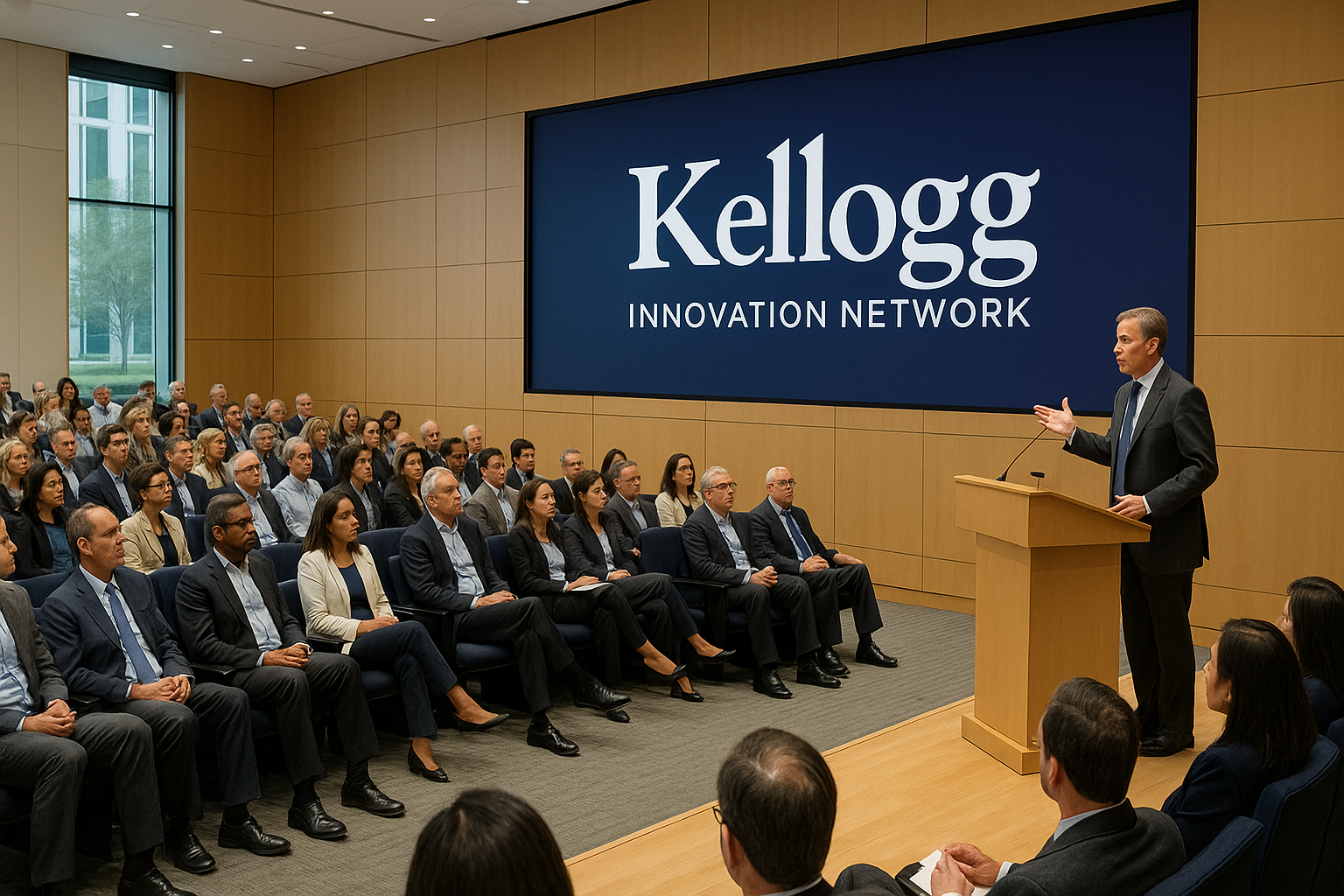Kellogg Innovation Network: A Bold Experiment in Collaboration That Sparked Both Breakthroughs and Challenges
Exploring the global impact, vision, and criticism of Kellogg’s premier innovation ecosystem

Introduction
In an era where disruption is constant and innovation is currency, few networks have bridged academia, industry, and policy as boldly as the Kellogg Innovation Network. Founded in 2003 by Professor Robert C. Wolcott of Northwestern University’s Kellogg School of Management, this initiative was envisioned as a forum for senior leaders to tackle global challenges through collaborative innovation.
While the Kellogg Innovation Network (KIN) has been praised for shaping strategy in sectors like mining, finance, and social enterprise, it has also faced scrutiny for its exclusivity and elite positioning. This article dives deep into its mission, structure, programs, and controversies—helping readers understand why the KIN matters in today’s innovation economy.
Quick Facts: Kellogg Innovation Network
| Attribute | Details |
|---|---|
| Name | Kellogg Innovation Network (KIN) |
| Founded | 2003 |
| Founder | Professor Robert C. Wolcott |
| Affiliation | Kellogg School of Management, Northwestern University |
| Core Focus | Collaborative innovation leadership |
| Membership | Invitation-only (executives, scholars, policymakers) |
| Key Programs | KIN Global Summit, Catalyst Forums, Ecosystem Expeditions |
| Global Impact | Sustainable development, corporate innovation, industry transformation |
| Spinoff Network | The World Innovation Network (TWIN) |
| Criticism Noted | Exclusivity, limited access for broader public |
| Future Direction | More inclusive models, global-local hybrid innovation frameworks |
The Vision Behind the Kellogg Innovation Network
The Kellogg Innovation Network was not just another university think tank. From the outset, it was built to create a space where leaders could co-design actionable frameworks to tackle global innovation challenges. Its founding mission was to move beyond theory and enable strategy grounded in systems thinking, execution, and real-world partnerships.
This vision attracted a unique blend of senior leaders from global companies, NGOs, government, and academia. KIN’s founders believed that when brilliant minds from diverse sectors gather under one roof, breakthroughs become possible. The idea was to build a cross-disciplinary network that would keep evolving with global innovation needs.
Membership and Structure: Elite Access With Targeted Impact
At its core, the Kellogg Innovation Network functions as an invitation-only forum. Members typically include executives, strategists, R&D heads, and policy influencers. This structure ensures high-quality conversations and peer-to-peer learning, but has also drawn criticism for being too exclusive.
Each member contributes either intellectually, through project participation, or as a thought leader in collaborative forums. KIN also relies on a Senior Fellows Council, consisting of rotating advisors and contributors who shape the strategic direction of its programs. This lean structure allows the network to remain agile and responsive to emerging global challenges.
KIN Global Summit: Where Thought Meets Action
The KIN Global Summit is the network’s flagship event. Held annually, this multi-day experience brings together leaders from over 30 countries. Topics span AI, climate change, ethical capitalism, sustainable development, and innovation policy. Sessions are designed not only to discuss but to co-create frameworks and pilot initiatives.
Summits have birthed impactful initiatives, including the “Mining Company of the Future” concept, which led to the Development Partner Framework—a model now influencing sustainable mining practices. While highly curated, these gatherings are also known for their creative formats, including storytelling labs, art installations, and design-thinking workshops.
Catalyst Forums and Expeditions: Building Long-Term Learning
Beyond summits, the KIN supports Catalyst Forums—long-form projects where members collaborate over 6–18 months. These are typically built around specific industries or global challenges, such as digital transformation in healthcare or climate-resilient urban planning.
KIN also organizes Ecosystem Expeditions to global innovation hubs like Tel Aviv, Berlin, and Silicon Valley. These expeditions provide real-time exposure to startup accelerators, venture capital networks, and policy labs, allowing members to learn by doing.
Thought Leadership and Research Contribution
KIN is deeply integrated with Kellogg’s academic framework, contributing to both teaching and publishing. Members often collaborate on case studies, white papers, and innovation models. For example, Robert Wolcott’s frameworks on scaling innovation in complex ecosystems have been cited in global business journals and adapted into executive education programs.
In addition, KIN has helped seed other impactful ventures, including The World Innovation Network (TWIN)—an independent platform that builds on KIN’s foundational principles to create broader global impact.
Achievements and Impact Across Sectors
The impact of the Kellogg Innovation Network is both tangible and symbolic. On one hand, it has contributed to specific industry solutions, such as the sustainability shift in mining and innovation strategies in retail and healthcare. On the other, it has inspired organizations to embrace innovation as a cultural mindset, not just a function.
Notable participating companies include Walmart, Anglo American, Ford Foundation, and Microsoft Ventures. These partnerships have led to real-world impact, transforming everything from procurement models to ethical investing strategies.
Criticism and Controversy: Innovation or Ivory Tower?
Despite its achievements, the Kellogg Innovation Network has not been without criticism. Detractors argue that its invitation-only model limits access, thereby reducing the diversity of thought it claims to champion. Others question whether the outcomes of its summits are scalable or largely conceptual.
In response, recent years have seen KIN open up certain sessions to Kellogg alumni and affiliated institutions, signaling a move toward more inclusive engagement. Still, the core tension between elite collaboration and mass accessibility remains.
The Road Ahead: Evolving With Global Needs
As the innovation landscape changes rapidly, so too must the KIN. New global crises—climate, conflict, digital ethics—demand more inclusive, scalable, and decentralized innovation models. The challenge for the Kellogg Innovation Network lies in staying relevant without losing its unique value proposition of high-level strategic dialogue and actionable outcomes.
With an increasing emphasis on digital collaboration, ethical leadership, and systemic design, the next phase of KIN may well involve hybrid models that blend local hubs with global dialogues, making innovation leadership accessible yet impactful.
Conclusion
The Kellogg Innovation Network stands at a fascinating crossroads. It is a global platform for powerful, intentional innovation, yet it must continuously evolve to address the criticism of exclusivity and ensure broader impact. As organizations around the world confront seismic shifts in technology, climate, and geopolitics, KIN’s role as a strategic convenor and thought leader has never been more important—or more contested.
The future of innovation will be defined not just by ideas, but by the networks that bring those ideas to life. KIN, with all its complexity, is one such network—flawed, evolving, and undeniably influential.
Frequently Asked Questions (FAQ)
What is the Kellogg Innovation Network?
It’s a global leadership forum created by Northwestern University’s Kellogg School to foster collaborative innovation across sectors.
Who can join the Kellogg Innovation Network?
Membership is by invitation and typically includes senior executives, policymakers, and academics focused on innovation.
What is the KIN Global Summit?
It’s the network’s annual flagship event where global leaders co-create strategies and frameworks for innovation.
What industries has KIN influenced?
KIN has impacted industries like mining, retail, tech, healthcare, and global philanthropy.
Is the Kellogg Innovation Network still active?
Yes, and much of its programming and philosophy now also influences The World Innovation Network (TWIN), a broader global platform.



